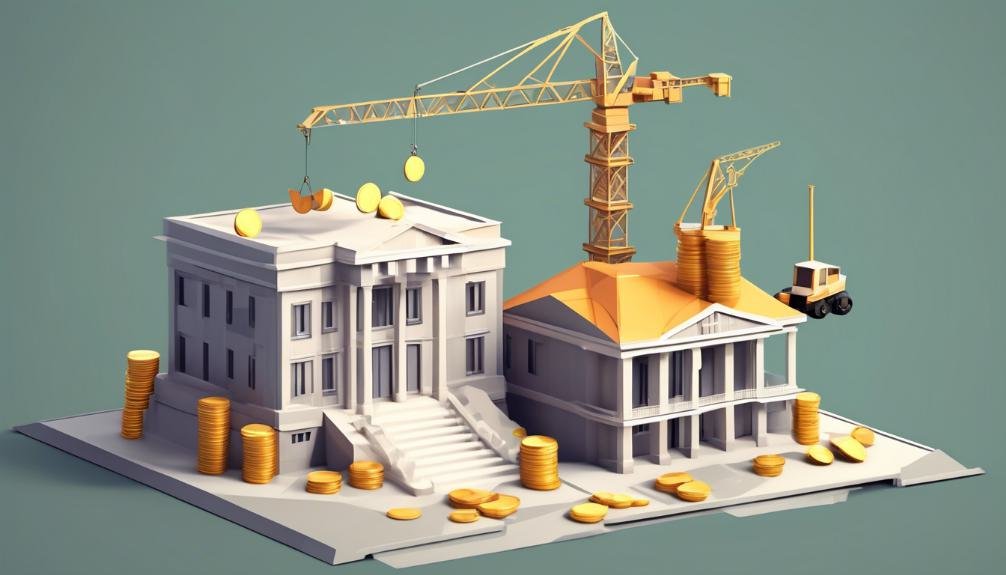In the past, people would've never imagined using economic trends to predict real estate values – it would've seemed like magic. But now, understanding these trends is crucial for smart property investments. You need to look at unemployment rates and interest rates, among other factors, to gauge property value changes. Each economic indicator is a piece of a bigger picture. Knowing the current state, past trends, and future projections of these indicators is key. It helps you decide when to buy, sell, or hold onto your properties.
Let's make this clearer. For example, if unemployment is rising, fewer people can afford to buy homes, which could lower property values. On the other hand, low-interest rates can make loans cheaper, which might increase the demand for homes, pushing up their value. So, keep a close eye on these indicators. They can guide you to make the right moves at the right time in the real estate market. Always aim to understand the full scenario before making a decision.
Unemployment Rates Influence

Unemployment rates have a big impact on house prices because they show how well the local economy is doing and whether people can afford to buy or rent homes. When lots of people are out of work, there aren't as many people looking to buy or rent homes, which can lead to too many houses on the market and lower prices.
On the other hand, when few people are unemployed, they feel more secure in their finances and are more likely to buy homes, pushing up demand and prices. This is especially true in places like Chambersburg, Shippensburg, Waynesboro, and Greencastle, where job availability really affects the economy.
By keeping an eye on how unemployment rates are changing, you can get a good idea of where the housing market is headed. If unemployment is going down, home prices might go up soon. But if more people are starting to lose their jobs, it could mean house prices will drop. Paying attention to these patterns can help you make smart choices when investing in real estate.
To put it simply, understanding the link between jobs and house prices is key. For example, if a new factory opens in Greencastle, creating hundreds of jobs, it's likely that more people will move to the area for work. This new demand for housing can increase home prices there. So, by watching job trends, you can guess which way the housing market will go. This approach is not only smart but can help you make better investment decisions with confidence.
Interest Rate Fluctuations
Unemployment rates matter in real estate, but so do changes in interest rates. Here's how it works: when interest rates go up, it gets more costly to get a mortgage, and this might make fewer people want to buy homes. If fewer people are buying, the competition drops, and you might have more room to negotiate if you're selling, but you could also end up with a lower sale price.
On the other hand, when interest rates go down, loans are cheaper. This can cause more people to start looking for homes, and the increased competition can drive house prices up. But remember, this boost in property values might not last. It's really important to keep an eye on these changes and understand what they mean in the bigger picture to make smart decisions in real estate.
For example, if the central bank announces a drop in interest rates, that might be a good time to think about buying a property, because your mortgage payments could be lower. But if you hear interest rates are going up, and you're looking to sell, you might want to act quickly before the higher rates potentially slow down buyer interest.
Always stay on top of the latest news and analyze the details carefully to make the best moves in the property market. Chat with experts, read up on trends, and use tools like mortgage calculators to see how different rates could affect your payments. That way, you'll be better equipped to handle whatever the housing market throws your way.
Gross Domestic Product Trends

Understanding Gross Domestic Product (GDP) trends is like taking the economy's temperature. When the GDP is rising, it usually means the economy is doing well. This can lead to more people wanting to buy houses and offices, which pushes up property prices. But if the GDP is falling or not growing much, it could mean trouble for the economy and property prices might stop going up or even drop.
It's important to look at both what's happening with the GDP across the country and what's going on locally. Even if the national economy looks good, the situation can be different in places like Chambersburg or Waynesboro. The types of jobs and industries in those areas can really affect local property prices.
To stay on top of things, keep an eye on the GDP reports that come out every three months. If you see the GDP going up steadily over time, it often means the housing market is strong. Businesses are probably doing well, more jobs are available, and people feel good about buying property.
By paying close attention to these numbers, you can get a good idea of where the housing market is headed. Knowing how the GDP and property prices are connected can help you make smart decisions about buying or selling property.
Here are some tips: Watch for new businesses opening up, as they can boost the local economy. Also, keep an eye on the job market. If more jobs are available, it's a good sign for the housing market. And remember, these trends can change, so it's important to stay informed.
Consumer Confidence Measures
Just like how we can tell if a person is healthy by their overall wellness, consumer confidence is like a close-up view of how people feel about their money and if they're ready to buy big things like houses. When people are feeling good about the economy, they often buy more homes, which can make house prices go up. But if they're worried, they might not buy homes, which can cause prices to stay the same or even drop.
- Effect on the Housing Market
- *Worries About Inflation*: If things cost more and money doesn't go as far, people might not feel as good about buying homes, which can slow down the housing market.
- *Interest Rates*: How much it costs to borrow money can change how people feel about buying homes. If loans get expensive, fewer people might want to buy.
- *Job Market*: Whether people have jobs and feel secure about their money is a big deal for whether they want to buy a home.
Understanding how people feel about their money and the economy helps us see what's really going on in the housing market. It's especially important to watch how inflation and consumer confidence are connected because this often shows us where house prices might be heading. Keeping an eye on these things helps us guess what might happen next with house prices, so we can make smart choices.
Government Fiscal Policies

Government actions like changing tax laws and deciding where to spend money are key factors in the health of the housing market. These decisions affect how much money people have to spend and where they might want to live.
For example, when the government raises taxes without increasing people's pay, families have less money to spend on homes. This can lead to fewer people buying houses, which can make house prices go down. However, if the government offers tax breaks to people buying homes, this can encourage more people to buy, which can push prices up.
Government spending can also affect the housing market. When the government puts money into things like roads and schools, it can make a neighborhood more desirable. This often means that houses in that area become more valuable.
It's also important to look at whether the government is spending more money than it's making (a deficit) or if it has extra money (a surplus). A big deficit could cause higher interest rates, as the government needs to borrow money. This can make getting a mortgage more expensive and slow down the rise in house prices.
On the flip side, if the government has a surplus, this could lead to lower interest rates and more borrowing. This can help keep the housing market strong.
Keep an eye on these things, as they can give you a better idea of where house prices might be headed in your community.
Conclusion
Navigating the economy, it's crucial to understand how different factors can affect house prices. High unemployment can reduce people's ability to buy homes, causing prices to drop. Changes in interest rates also have a big impact – when rates go up, borrowing money becomes more expensive, and fewer people can afford mortgages, which can lower house prices. Conversely, when they go down, it's cheaper to borrow, potentially boosting house prices.
The Gross Domestic Product (GDP) is another important indicator. If the GDP is growing, it usually means the economy is strong, and people are more likely to buy houses, driving prices up. On the other hand, if the GDP is falling, the weakened economy could lead to a decrease in property values.
Consumer sentiment – how people feel about the economy – can influence whether they think it's a good time to buy a house. If people are optimistic, property values often go up because more people are looking to buy. Lastly, government policies that influence spending and taxes can either support or hinder property values.
So, when you're considering investing in real estate, pay attention to these economic indicators. They can help you understand where the market might be heading. For example, if you know interest rates are likely to rise, it might be a good time to lock in a lower rate on a mortgage before prices go up.
Keep a close eye on the economy, and use this information to make smarter investment choices. Think of it as having a map and compass to guide you through the complex world of property investment. By doing so, you could help your investments grow over time.

